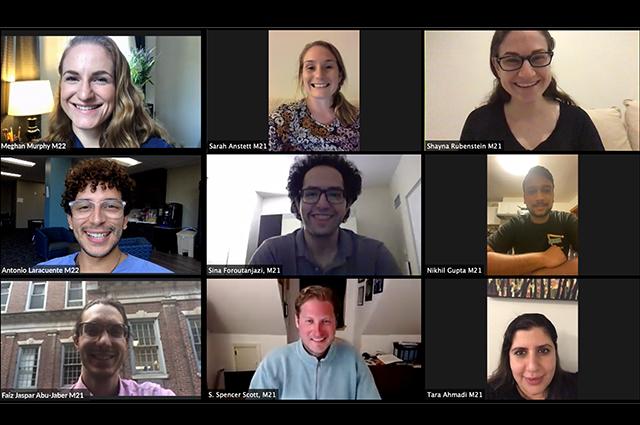-
About
- Departments & Offices
-
Academics
- Physician Assistant
- Special Master’s (MBS)
-
Admissions & Financial Aid
- Tuition & Fees
-
Student Life
-
- Student Resources by Program
- Academic & Student Support
- Wellness & Wellbeing
- Student Experience
- Events & Traditions
-
-
Research
- Research Labs & Centers
-
Local & Global Engagement
- Global Health Programs
- Community Engagement
A Student Compact for Safety
Tufts medical students commit to responsible behavior as they return to clinical settings during the pandemic

When their rotations were paused in mid-March because of the developing pandemic, medical students knew that whenever they returned to clinical settings, things would be different. Medical schools, hospitals and clinics, and individuals would need to take steps to ensure the safety of students, health professionals, and patients, while providing meaningful learning experiences.
So in mid-June, several students from Tufts University School of Medicine’s classes of 2021 and 2022 got together to develop a Student COVID Compact, a framework for students to take ownership of their responsibility and behavior in this challenging and rapidly evolving time.
Under the initial guidance of Dean of Student Affairs Amy Kuhlik and her office, the students drafted a document to help the student body develop a culture of safety, while respecting that the guidelines around the outbreak would continue to change.
“The compact serves as a commitment we make with one another to live, work, and socialize in a manner which keeps our patients, our communities and ourselves safe without creating unrealistic expectations for isolation,” the document reads. “It is not a prescription for what we, as medical students, can and cannot do, but rather a simple promise to hold ourselves to a rigorous standard of behavior.”
Students want to know how to make the best decisions when working in clinical settings, said Meghan Murphy, M22, who developed the compact along with Antonio Laracuente, M22; Tara Ahmadi, M22; Shayna Rubenstein, M21; Faiz Jaspar Abu-Jaber, M21; Spencer Scott, M21; Sarah Anstett, M21; Nikhil Gupta, M21; Sina Foroutanjazi, M21; and recent graduate Caitlin Fai, M20.
“As students who are there primarily to learn, we wouldn’t necessarily be considered ‘essential workers,’ but we are providing care and we are around healthcare workers who are essential,” Murphy said. “We have to hold ourselves to a high standard for our safety as well as the safety of everyone in the hospital and the communities we enter.”
In drafting the document, the students drew on school and clinical site policies and guidance from local, state (Massachusetts and Maine), and federal authorities. The group then shared it with the M21 and M22 classes for their input, encouraging everyone to take ownership of the document’s principles.
“It was nice to see so many people engage in the process,” Abu-Jaber said. “We could say, ‘Here’s what we’re worried about, what do you think? Tell us what else you’re worried about.’”
Once the classes settled on the document, the group shared it with Kuhlik at the end of June. The whole process took about two weeks.
“There is an honor code for exams, so why not a compact for this?” Ahmadi remarked.
The compact’s guiding principles to help students make informed decisions include being mindful of the heightened level of precaution and accountability for healthcare workers; adhering to individual institutions’ policies; staying current on local, state, and federal guidance; and considering everything in light of the healthcare providers they want to be. The compact also includes a strategy built on five “pillars,” masks, hygiene, distancing, screening, and culture. They were inspired by the safety lessons that hospitals have learned during the pandemic, as outlined by Atul Gawande in a May New Yorker article.
The compact recognizes the dual public health crises of the pandemic and systemic racism, and includes a commitment to anti-racism and safely supporting activism efforts.
As part of the compact, students pledge to practice social distancing and wear masks even when others, including their professional seniors, do not. The organizers say this reinforces that students must think for themselves and not rely on copying what goes on around them. “You see variation even among doctors. You have to do what’s right for you,” Abu-Jaber said.
When the draft was sent out to all students, some responded that they wanted there to be detailed rules—the maximum number of people they could hang out with, whether they could go to parties, a yes or no on leaving the state—but the document isn’t meant to give specifics.
“Medical students often struggle without clear direction, but nothing is clear in this pandemic. All of this has provided a learning and growth opportunity,” Murphy said.
The students say they’ll continue to revisit and update the compact as needed, as they did when New England interstate travel guidance changed in early August. They envision it as a living document, resource, and forum for students to submit questions. Since the compact was created, students have sought advice from one another about how they would handle particular situations, such as attending a family reunion or leaving the state.
For Rubenstein, being a medical student means being more cautious both inside and outside the clinic than the average person. “It can be trying,” she said. “Sometimes I feel I’m missing out on things my friends who aren’t in medicine are doing. But I’m not taking part because I’m involved in patient care. I work with essential workers who have done so much in the last five months. I know I have different responsibilities.”